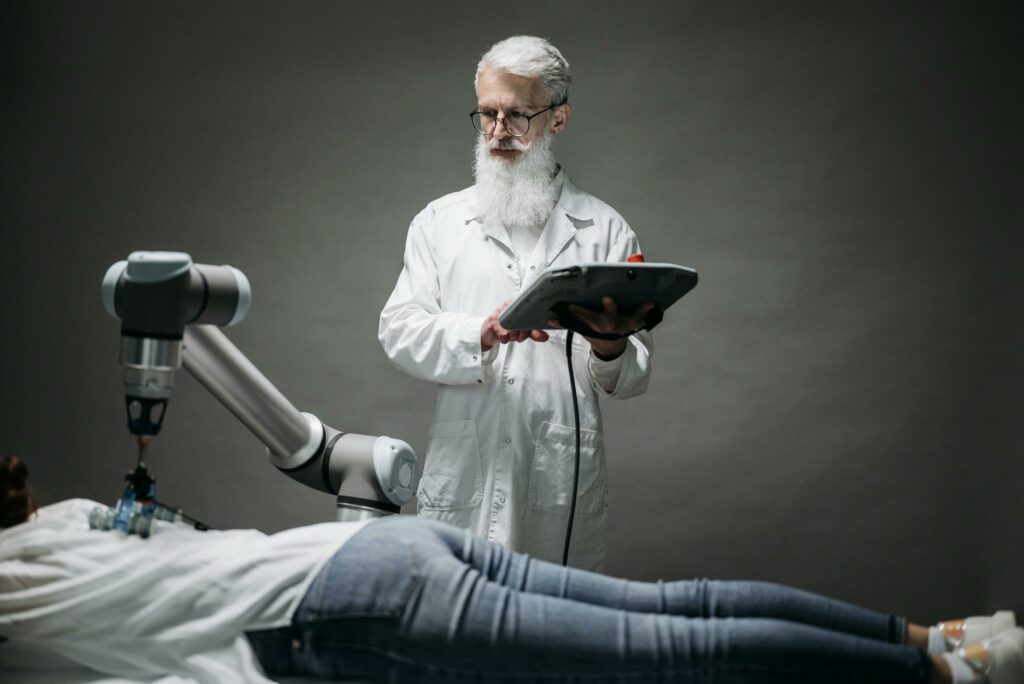How AI is Changing the Future of Healthcare
AI is changing healthcare in a big way, making it faster, smarter, and more tailored to each person than ever before. AI is changing the way doctors work and patients get better by making it possible to diagnose diseases with pinpoint accuracy and forecast how patients will do before they show symptoms. The future of medicine is here, and it’s fuelled by algorithms.

This includes robotic surgery, AI-powered drug development, and virtual health assistants.
AI: The Doctor We Didn’t Know We Needed
Picture a doctor who never sleeps, knows everything there is to know about every medical case ever documented, and can see patterns that people can’t see. That’s what AI does in healthcare. Machine learning algorithms look at a lot of data, such patient records, lab findings, and even genetic information, to find diseases like cancer earlier than other approaches. Some AI systems can now tell if someone is about to have a heart attack by looking at their retinal scans or if someone has Parkinson’s only by listening to their voice. It’s like having a medical Sherlock Holmes, but with greater technology and fewer habits of smoking pipes.
Robots in the Operating Room? Yes, please!
AI-powered robots are giving surgery a high-tech boost. Systems like the Da Vinci Surgical Robot help surgeons move in very precise ways, which lowers the chance of mistakes and speeds up recovery. But the actual magic? AI can recommend the best ways to do things in real time based on thousands of procedures it has seen. It’s like a GPS for surgeons, but instead of telling you to avoid traffic, it’s telling a knife where to go around important nerves.
Finding new drugs at warp speed
It normally takes ten years and billions of dollars to produce new drugs. AI is cutting that time down by figuring out which medicinal compounds will function before they are even tried. AI is helping companies mimic millions of molecular interactions, which helps them find possible therapies for diseases like Alzheimer’s and COVID-19 in months instead of years. You have a crystal ball for biochemistry.
Your New Virtual Nurse (Who Never Judged You for Looking Up Symptoms)
Chatbots and virtual health aides are making it easier for people to get health care. Need help at three in the morning? You don’t have to wait on hold to talk to an AI-powered assistant that can check your symptoms, remind you to take your meds, or even make an appointment with a doctor. Some apps employ AI to keep an eye on long-term health problems and let doctors know if your vital signs go crazy. Without the awkward small conversation, it’s like having a nurse in your pocket.
What about the future? Better, Faster, and (Hopefully) Without Needles
AI isn’t going to take the position of doctors, but it is giving them superpowers. Wearable technology may soon be able to anticipate flu outbreaks before they begin, and AI might make treatment programs just for you based on your DNA. Of course, there are still problems to solve, like making sure AI doesn’t unintentionally prescribe pizza for pneumonia (hey, algorithms aren’t perfect… yet). But one thing is clear: the future of healthcare isn’t simply human. It’s people and AI working together to make us healthier, happier, and maybe even a little more bionic.
Don’t worry if your doctor talks about AI next time. It’s not Skynet. It’s the newest member of the medical team, and its job is to help you live your best (and healthiest) life.




